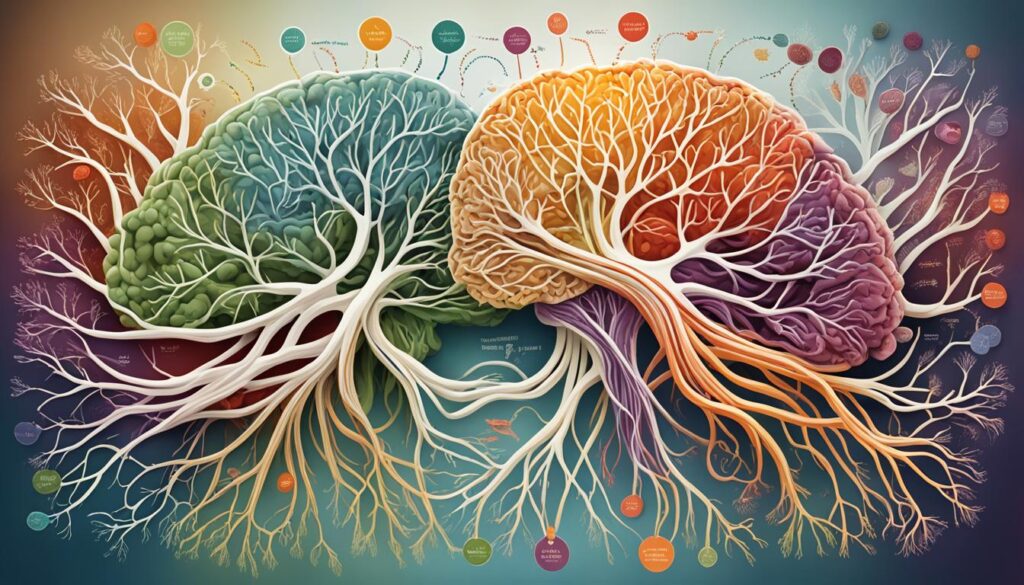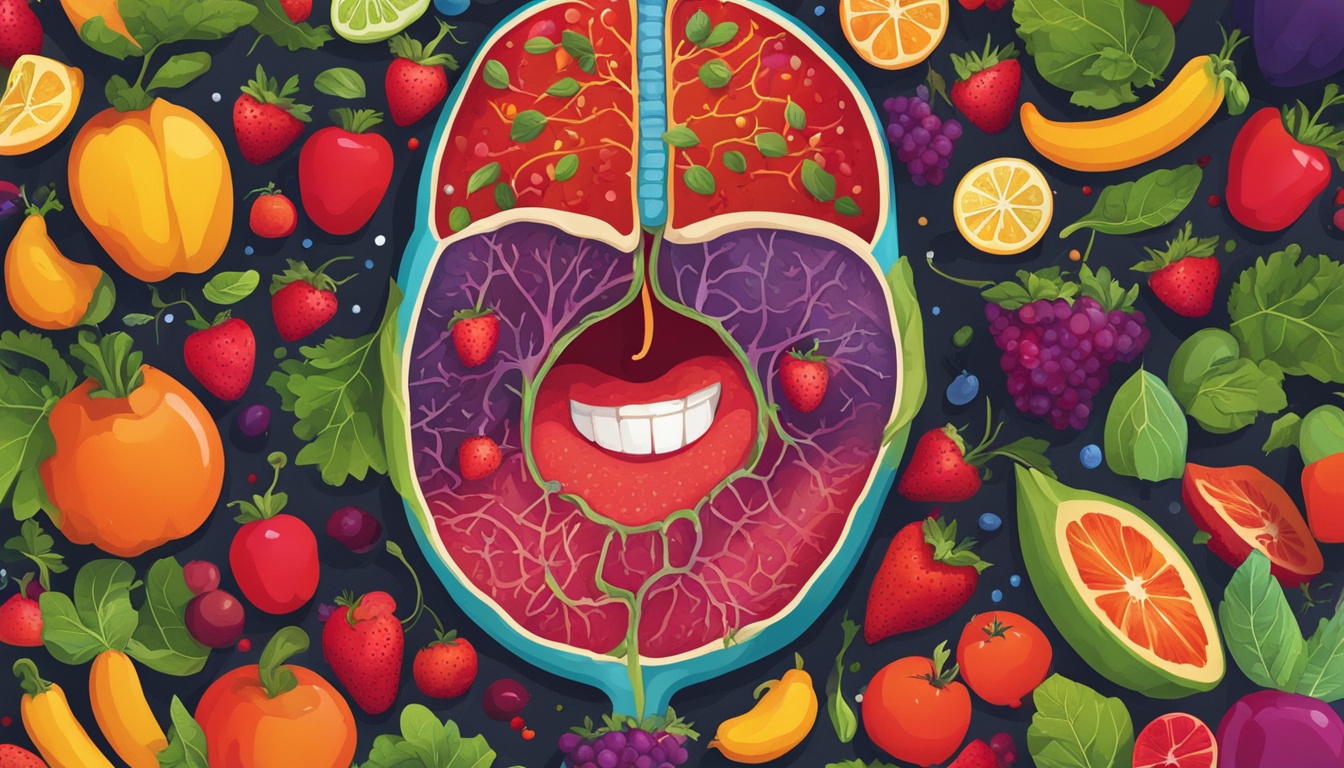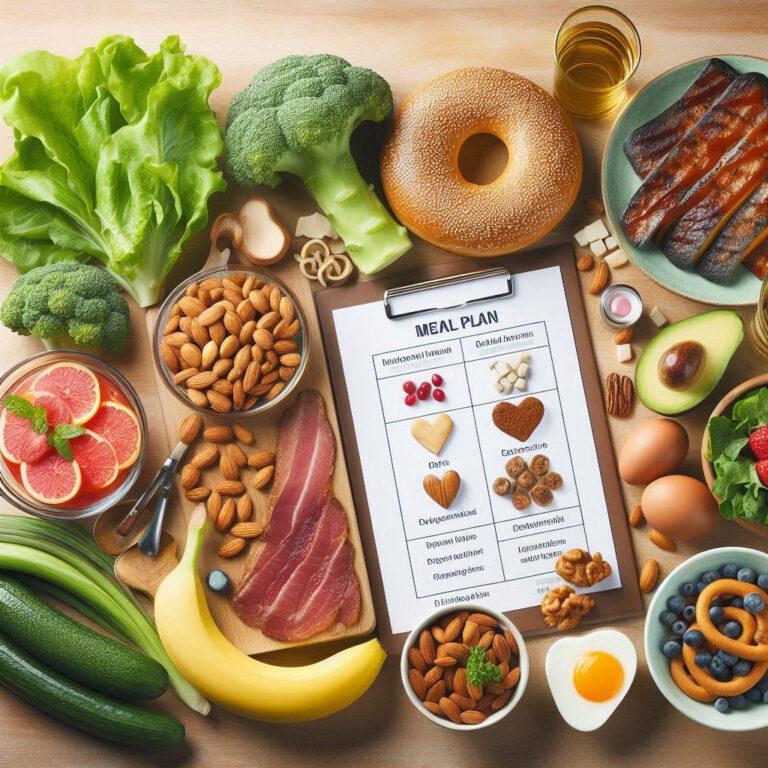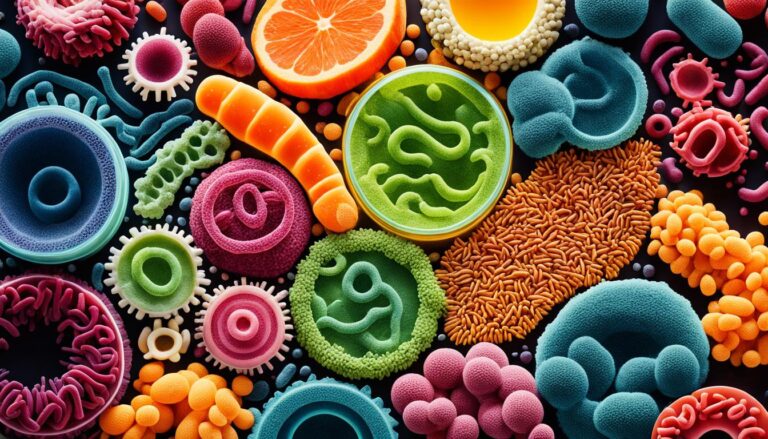Have you ever wondered if the health of your gut could be directly linked to your mental well-being? Emerging research suggests that the connection between the gut and the brain may be more profound than we ever imagined. By exploring this intricate relationship, we may uncover groundbreaking insights that could revolutionize how we approach mental health challenges.
Key Takeaways
- The gut microbiome, the trillions of microbes living in the human gut, has been linked to mood and mental health.
- This interaction between the gut and the nervous system is known as the gut-brain axis.
- Diet plays a significant role in shaping the gut microbiome, which in turn can influence mental health.
- Studies have found a connection between the presence or absence of certain gut bacteria and the presence or absence of symptoms of depression.
- Exploring the gut-brain connection could lead to new approaches for treating mental health conditions.
Groundbreaking Study: Measuring Neural Responses to Gut Sensations
Researchers at the Laureate Institute for Brain Research (LIBR) have unveiled a pioneering study that sheds new light on the intricate gut-brain connection. By utilizing a minimally invasive vibrating capsule, the team was able to measure the neural responses triggered by gastrointestinal sensations, offering a novel approach to understanding this complex relationship.
Pioneering Vibrating Capsule Method
The study’s innovative vibrating capsule technique allowed the researchers to stimulate the gut and precisely monitor the resulting neural activity. This method proved to be a significant advancement in the field, as it provided a more direct and localized assessment of gut mechanosensation compared to traditional techniques.
Localized Gastric Evoked Potentials in the Brain
The findings of the study were remarkable. The researchers discovered that the vibrating capsule stimulation induced distinct neural responses, termed “gastric evoked potentials,” in specific areas of the brain. Interestingly, the amplitude of these potentials increased in proportion to the intensity of the gut stimulation, offering a unique window into the brain’s processing of gut-brain interaction.
Potential Clinical Implications for Gut-Brain Disorders
The implications of this groundbreaking study are far-reaching. The vibrating capsule method could revolutionize the clinical approach to disorders of the gut-brain axis, including irritable bowel syndrome (IBS) and functional dyspepsia. By providing a more direct and objective assessment of the neural responses to gut stimuli, this innovative technique holds the potential to enhance our understanding and management of these complex gut-brain disorders.
“This pioneering study has the potential to transform our understanding of the gut-brain connection and pave the way for more effective clinical interventions for disorders that involve this crucial axis.”
The Gut-Brain Axis: A Complex Relationship
The gut-brain axis is a fascinating and intricate connection between the trillions of microbes that reside within our gut and the nervous system. This dynamic interaction has been a captivating focus of scientific research, as it holds the potential to influence our mood, anxiety levels, and overall mental well-being.
At the core of this gut-brain axis lies the gut microbiome – the diverse community of bacteria, fungi, and other microorganisms that call our intestines home. The composition and diversity of this microbiome have been closely linked to the production of neurotransmitters and other signaling molecules that can directly impact brain function and mental health.
For instance, certain gut bacteria are known to synthesize serotonin, a key neurotransmitter that plays a pivotal role in regulating mood. Imbalances in the gut microbiome have also been associated with an increased risk of developing mental health disorders, such as depression and anxiety.
The gut-brain axis is a truly complex and multifaceted relationship, with the potential to revolutionize our understanding and treatment of various mental health conditions. As research in this field continues to evolve, we can look forward to even more groundbreaking insights into the intricate workings of this gut-brain connection.
Gut Microbiome and Mental Health: Emerging Evidence
The intricate connection between the gut microbiome and mental health is a rapidly evolving field of study. Recent research has unveiled fascinating insights into the role of specific gut bacteria in influencing mood and well-being.
Gut Bacteria and Depressive Symptoms
Numerous studies have found consistent links between certain populations of gut bacteria and the presence of depressive symptoms. An analysis of the gut microbiome revealed that an overgrowth of the bacterium Eggerthella was associated with depression, while a depletion of Subdoligranulum correlated with the onset of depressive symptoms. These findings lend further support to the theory that the gut-brain axis plays a crucial role in mental health.
Dietary Influences on Gut Microbiome Diversity
The composition of the gut microbiome is heavily influenced by dietary choices, and this, in turn, can impact mood and overall well-being. A diverse and balanced gut microbiome, rich in beneficial bacteria, has been linked to improved mental health outcomes. Conversely, diets high in processed foods and low in fiber can lead to a less diverse gut ecosystem, potentially contributing to the development of anxiety and depression.
| Gut Bacteria | Impact on Mental Health |
|---|---|
| Eggerthella | Overgrowth associated with depression |
| Subdoligranulum | Depletion linked to depressive symptoms |
These emerging insights underscore the crucial link between gut health and mental well-being, opening up new avenues for the development of targeted nutritional and lifestyle interventions to support overall brain and mental health.
gut health and mental health: A Crucial Link
The gut-brain axis, the intricate two-way communication between the gut and the brain, has emerged as a critical factor in understanding mental health conditions like depression and anxiety. Mounting evidence suggests that the gut microbiome, the diverse community of microorganisms dwelling in the digestive tract, can profoundly influence the production of neurotransmitters and other signaling molecules that impact brain function and overall mood.
The gut microbiome plays a pivotal role in the regulation of these neurotransmitters, such as serotonin, which is closely linked to mood and emotional well-being. Imbalances or disruptions in the gut microbiome have been associated with increased risk of depression and anxiety.
Moreover, the gut-brain axis is not a one-way street. The brain can also influence the composition and function of the gut microbiome through various mechanisms, including the nervous system, immune system, and endocrine system. This bidirectional communication underscores the critical importance of maintaining a healthy gut for overall mental well-being.
“The health of the gut and the brain are intricately connected, and disruptions in one can have profound effects on the other.”
Researchers are actively exploring the clinical implications of the gut-brain axis, particularly in the development of personalized treatment approaches for mental health disorders. By understanding the complex relationship between gut health and brain health, healthcare providers may be able to devise more effective strategies for promoting mental well-being and addressing conditions like depression and anxiety.

As the scientific community continues to unravel the intricacies of the gut-brain connection, the potential for groundbreaking advancements in the field of mental health becomes increasingly promising. By nurturing a healthy gut microbiome through targeted interventions, individuals may be able to support their overall mental health and resilience.
Nutritional Strategies for Mental Well-being
Maintaining good gut health is crucial for supporting mental well-being. By incorporating specific nutritional strategies into our diets, we can nurture the gut-brain connection and promote overall mental health.
Probiotics and Prebiotics for Gut Health
Probiotics, the beneficial bacteria that reside in our gut, play a vital role in supporting mental health. Consuming probiotic-rich foods like yogurt, kefir, and fermented vegetables can help establish a diverse and balanced gut microbiome. Pairing probiotics with prebiotics, the indigestible fibers that nourish our gut flora, is an effective approach to optimizing gut health.
Omega-3 Fatty Acids and Subdoligranulum
Omega-3 fatty acids, found in foods like fatty fish, walnuts, and flaxseeds, have been shown to support mental well-being. These healthy fats can help maintain populations of beneficial bacteria, such as Subdoligranulum, which are associated with reduced depressive symptoms. Incorporating omega-3 rich foods into our diets can be a powerful nutritional strategy for supporting both gut and mental health.
| Nutrient | Food Sources | Benefits for Mental Health |
|---|---|---|
| Probiotics | Yogurt, kefir, fermented vegetables | Promote a diverse and balanced gut microbiome |
| Prebiotics | Whole grains, fruits, vegetables, legumes | Nourish the growth of beneficial gut bacteria |
| Omega-3 Fatty Acids | Fatty fish, walnuts, flaxseeds | Support populations of Subdoligranulum, a bacteria associated with reduced depression |
By strategically incorporating probiotics, prebiotics, and omega-3 fatty acids into our diets, we can foster a healthy gut microbiome and support our overall mental well-being. These nutritional strategies offer a natural and holistic approach to nourishing the gut-brain connection.
Lifestyle Factors and the Gut-Brain Connection
While diet plays a crucial role in shaping the gut microbiome, other lifestyle factors can also significantly influence the intricate gut-brain relationship and impact mental health. One such factor is chronic stress, which has been shown to alter the composition of the gut microbiome, potentially contributing to the development of mood disorders like depression and anxiety.
In addition to stress, social interactions, both positive and negative, can also shape the gut microbiome, highlighting the complex, bidirectional nature of the gut-brain connection and its impact on overall mental well-being. Positive social interactions, such as strong personal relationships and a sense of community, have been linked to a more diverse and healthy gut microbiome, while negative social experiences, such as social isolation or conflict, can disrupt the delicate balance of the gut ecosystem.
Stress, Social Interactions, and Gut Microbiota
Emerging research suggests that stress can trigger changes in the gut microbiome, potentially leading to an imbalance in the microbial community and contributing to the development of mental health issues. Chronic stress can alter the production of hormones and neurotransmitters, which can, in turn, influence the composition and function of the gut microbiome.
Similarly, social interactions can shape the gut microbiome through various mechanisms, including the exchange of microbes, the production of stress-related hormones, and the influence of social behaviors on dietary habits. Positive social experiences have been linked to a more diverse and resilient gut microbiome, while negative social interactions, such as social isolation or conflict, can disrupt the delicate balance of the gut ecosystem.

“The gut-brain connection is a complex and dynamic relationship, with lifestyle factors playing a crucial role in shaping both our mental health and the health of our gut microbiome.”
By understanding the intricate relationship between lifestyle factors, the gut microbiome, and mental health, individuals can make informed choices to support their overall well-being, including through stress management techniques, fostering positive social connections, and maintaining a healthy gut environment.
Personalized Approaches and Future Directions
As the understanding of the gut-brain axis continues to expand, personalized medicine approaches that consider an individual’s unique gut microbiome and its influence on mental health may become increasingly important for developing more effective treatment strategies. The groundbreaking study’s vibrating capsule method could transform the clinical approach to disorders of gut-brain interaction, providing a much-needed tool for assessing gut sensation in conditions like eating disorders, irritable bowel syndrome (IBS), and functional dyspepsia.
This novel technique also opens up the possibility of identifying perceptual or biological mediators of successful treatment, which could serve as predictive markers for future therapeutic interventions. By understanding an individual’s gut microbiome and its intricate connection to their mental health, clinicians may be able to tailor personalized medicine approaches that target the gut-brain axis more effectively, leading to improved treatment strategies and better outcomes for patients.
“As the gut-brain connection becomes more clearly defined, the potential for personalized approaches to mental health treatment that address the underlying gut microbiome is truly exciting.”
The future of gut-brain research holds promise for a more holistic and individualized understanding of mental health disorders, paving the way for innovative treatment strategies that leverage the power of the gut microbiome as a predictive marker for personalized interventions.
| Personalized Medicine Approach | Potential Benefits |
|---|---|
| Gut microbiome analysis | Identify unique microbial profiles associated with mental health conditions |
| Targeted probiotic/prebiotic therapies | Modulate gut microbiome to improve mental well-being |
| Vibrating capsule technology | Assess gut-brain interactions and inform personalized treatment plans |
Conclusion
The groundbreaking research on the gut-brain connection has unveiled a profound understanding of the intricate relationship between gut health and mental well-being. By leveraging innovative techniques like the vibrating capsule method, scientists have been able to delve deeper into the neural mechanisms underlying this complex interaction.
The findings suggest that the diversity and composition of the gut microbiome, which can be influenced by diet and other lifestyle factors, play a pivotal role in shaping our mood, anxiety levels, and overall mental health. As this field continues to evolve, personalized approaches that harness the power of the gut-brain axis may lead to more effective strategies for preventing and treating mental health disorders.
Moving forward, ongoing research on the gut-brain connection, the gut microbiome, and the impact of dietary and lifestyle choices will undoubtedly uncover new insights and pave the way for transformative advancements in the realm of mental health. By embracing this holistic understanding of the gut-brain relationship, we can empower individuals to take proactive steps towards optimizing their overall well-being.
FAQ
What is the gut-brain axis and how does it relate to mental health?
The gut-brain axis is the bidirectional communication between the gut and the brain. This interaction has been linked to the production of neurotransmitters and signaling molecules that can impact brain function, mood, and overall mental well-being.
How can the gut microbiome influence mental health?
The composition and diversity of the gut microbiome, the trillions of microorganisms living in the digestive tract, have been consistently connected to the presence of depressive symptoms and other mental health disorders. Certain gut bacteria can influence the production of neurotransmitters that affect mood and brain function.
What is the vibrating capsule method and how can it transform the clinical approach to gut-brain disorders?
The vibrating capsule method is a minimally invasive technique used to measure neural responses to gastrointestinal sensations. This pioneering study revealed that the capsule stimulation induced specific brain responses, called “gastric evoked potentials,” which could help identify perceptual or biological mediators of successful treatment for conditions like eating disorders, irritable bowel syndrome, and functional dyspepsia.
How can diet and lifestyle factors influence the gut-brain connection and mental health?
Diet, which directly shapes the gut microbiome, can play a significant role in mental well-being. Consuming a diverse array of fiber-rich foods, such as vegetables, fruits, and whole grains, can support a healthy gut microbiome. Omega-3 fatty acids and probiotics have also been linked to improved mental health. Additionally, lifestyle factors like chronic stress and social interactions can alter the gut microbiome and contribute to the development of mood disorders.
What are the potential future directions in personalizing approaches to the gut-brain connection and mental health?
As the understanding of the gut-brain axis continues to evolve, personalized approaches that consider an individual’s unique gut microbiome and its influence on mental health may become increasingly important for developing more effective treatment strategies. Techniques like the vibrating capsule method could help identify specific biological markers and perceptual mediators that could guide personalized interventions for mental health disorders.
Source Links
- https://utulsa.edu/news/groundbreaking-study-reveals-insights-into-gut-brain-connection/ – Groundbreaking study reveals insights into gut-brain connection
- https://www.ncbi.nlm.nih.gov/pmc/articles/PMC10384867/ – The Role of Gut Microbiota in Anxiety, Depression, and Other Mental Disorders as Well as the Protective Effects of Dietary Components
- https://www.uclahealth.org/news/article/research-says-gut-brain-axis-plays-role-mental-health – Research says gut-brain axis plays role in mental health





I don’t think the title of your article matches the content lol. Just kidding, mainly because I had some doubts after reading the article.
Your article helped me a lot, is there any more related content? Thanks!
I don’t think the title of your article matches the content lol. Just kidding, mainly because I had some doubts after reading the article.
Can you be more specific about the content of your article? After reading it, I still have some doubts. Hope you can help me.
Thank you for your sharing. I am worried that I lack creative ideas. It is your article that makes me full of hope. Thank you. But, I have a question, can you help me?
Can you be more specific about the content of your article? After reading it, I still have some doubts. Hope you can help me.
Can you be more specific about the content of your article? After reading it, I still have some doubts. Hope you can help me.
Thank you for your feedback—I appreciate your interest in the article! I’d be happy to clarify any specific points or address your doubts. Could you let me know which part you’d like me to elaborate on? 😊